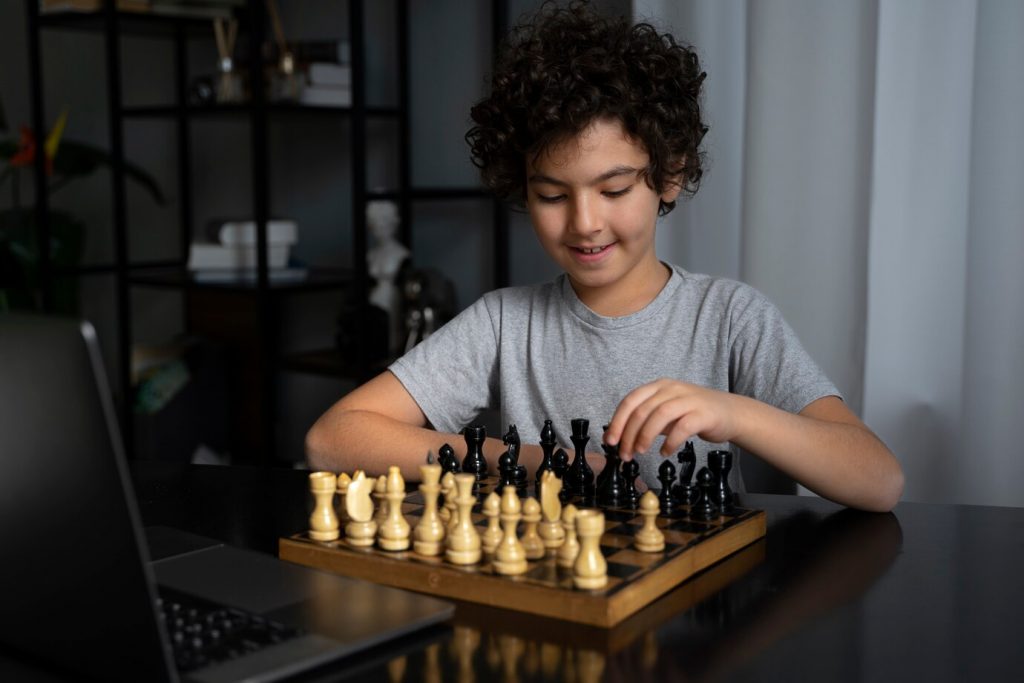Spotting the Prodigy
Every chess prodigy begins their journey with that “Aha!” moment, a spark that sets them apart from their peers. Recognizing this early potential is the first step in nurturing a prodigy. However, it’s important to note that not everyone is destined to be a prodigy, and that’s perfectly okay. In fact, statistics tell us that the probability of someone becoming a prodigy is quite low. Chess prodigies often come from diverse backgrounds, and their early access to chess and foundational advantages can play a significant role in their development.
Early Exposure, Not Pressure
Introducing chess to your child should be a joyful experience. Let them explore the pieces, make their moves, and embrace the game at their pace. The aim is not to pressurize but to instill a deep love for chess. Remember, chess prodigies often thrive in an environment of curiosity and wonder. It’s important to have realistic expectations and understand that not every child will exhibit prodigious talent.
Caissa School of Chess has become a top choice for chess players who are starting their chess learning journey. You may want to explore it before deciding your chess coach.
Dedication and Discipline
Behind every prodigy’s success lies dedication and discipline. Instill a strong work ethic, emphasizing the value of perseverance and hard work. Establish routines that balance chess practice, academics, and relaxation, creating a structured yet enjoyable environment. While chess prodigies may progress quickly, it’s important to remember that chess is a journey, not a destination, and each child’s path is unique.
Strategic Growth
Cultivating a chess prodigy involves a strategic approach to development. Identify their strengths and weaknesses, tailoring training sessions to address specific areas for improvement. Encourage them to participate in tournaments, where they can test their skills against diverse opponents and learn valuable lessons. But also, remember that progress in chess, as in life, can be gradual and nonlinear.
What Makes a Chess Prodigy?
A chess prodigy is typically a young player (often under the age of 15) who displays an exceptional understanding of the game, far beyond their years. Key traits of chess prodigies include:
- Natural Talent: An innate ability to grasp complex strategies and patterns.
- Rapid Improvement: The ability to learn and improve at an astonishing pace.
- Deep Focus: Exceptional concentration and mental stamina during games.
- Passion for the Game: A genuine love for chess that drives them to practice and study relentlessly.
Famous Chess Prodigies in History
- Paul Morphy (1837–1884)
- An American chess player who became one of the first unofficial world champions.
- Known for his intuitive understanding of the game and attacking style.
- By the age of 12, he was already considered one of the best players in the United States.
- José Raúl Capablanca (1888–1942)
- A Cuban chess prodigy who became World Chess Champion in 1921.
- Learned chess at the age of 4 by watching his father play.
- Known for his endgame mastery and effortless playing style.
- Bobby Fischer (1943–2008)
- An American chess legend who became the youngest Grandmaster at the age of 15 in 1958.
- Known for his intense focus and revolutionary contributions to opening theory.
- Defeated Boris Spassky in 1972 to become the 11th World Chess Champion.
Modern-Day Chess Prodigies
- Magnus Carlsen (Norway)
- Became a Grandmaster at the age of 13 in 2004.
- Known for his versatility and ability to play both positional and tactical chess.
- Currently one of the highest-rated players in history and a multiple-time World Chess Champion.
- Sergey Karjakin (Ukraine/Russia)
- Became the youngest Grandmaster in history at the age of 12 years and 7 months in 2002.
- Known for his defensive skills and deep preparation.
- Challenged Magnus Carlsen for the World Chess Championship in 2016.
- Rameshbabu Praggnanandhaa (India)
- Became an International Master at the age of 10 and a Grandmaster at 12.
- Known for his calm demeanor and exceptional defensive play.
- Defeated World Champion Magnus Carlsen in a rapid game in 2022, making headlines worldwide.
- Alireza Firouzja (Iran/France)
- Became a Grandmaster at the age of 14 in 2018.
- Known for his aggressive and creative playing style.
- One of the youngest players to cross the 2800 Elo rating mark.
- Gukesh Dommaraju (India)
- Became the second-youngest Grandmaster in history at the age of 12 years and 7 months in 2019.
- Known for his fearless approach and strong positional play.
- A rising star in the global chess arena.
Conclusion
Nurturing chess prodigies are a remarkable journey that demands unwavering support, dedication, and belief in your child’s potential. It’s a celebration of their unique brilliance and a testament to the power of chess to shape young minds into future grandmasters.
As you embark on this extraordinary voyage, remember that you’re not just crafting a chess player; you’re nurturing a future legend of the game. And even if your child doesn’t turn out to be a prodigy, their love for chess can lead to a lifelong passion for the game and countless valuable life lessons along the way.
Want your child to learn from the best? Enroll them in Caissa School of Chess and give them the foundation they need to excel.





